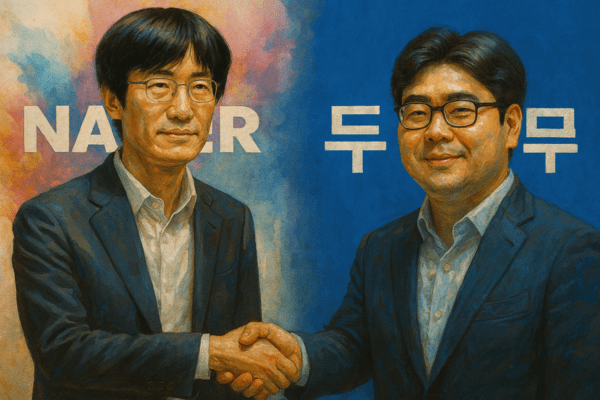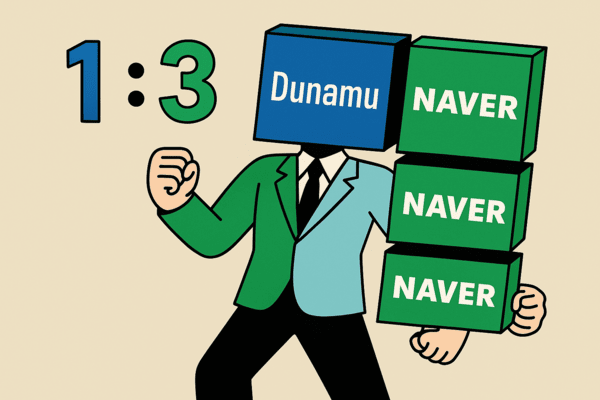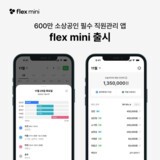Naver and Dunamu are set to hold board meetings next week to approve a comprehensive stock swap that would mark the official start of their merger process. The move signals a dramatic restructuring of Korea’s fintech and digital asset landscape into a unified mega platform valued at roughly 20 trillion won.

A Big Deal Set for the 26th with a Likely One-to-Three Swap Ratio
Naver Financial, a subsidiary of Naver, and Dunamu, the operator of Korea’s top cryptocurrency exchange Upbit, plan to bring a stock swap proposal to their respective boards on November 26. Industry officials believe the merger structure will effectively be finalized at this meeting. Markets expect the deal to be based on a ratio of one Dunamu share for three Naver Financial shares. If confirmed, Dunamu would become a wholly owned subsidiary of Naver Financial, with Naver acquiring Dunamu as a second-tier subsidiary.
The swap would elevate Dunamu Chairman Song Chi-hyung to the position of Naver Financial’s largest shareholder. Analysts see this shift not simply as corporate realignment but as a signal that Naver and Dunamu intend to build an integrated model combining finance, data and digital assets under one strategic framework.

What the One-to-Three Ratio Suggests About Corporate Value and Naver’s Expansion Strategy
The proposed valuation signals that Dunamu’s corporate value is being assessed at a premium relative to Naver Financial. Upbit continues to generate annual operating profits in the hundreds of billions of won, and its integration into the Naver ecosystem is expected to strengthen Naver’s financial stability and future growth capacity.
Observers interpret Naver’s maneuver as a deliberate move to expand into new fintech territory by combining Dunamu’s cryptocurrency and token-based services with Naver’s existing payment and commerce infrastructure. The structure allows Naver to step back from a direct financial-operator role and reduce regulatory constraints while still securing long-term platform growth.
A Shift in the Regulators’ View of Financial-Crypto Separation
The rapid acceleration of the merger process is widely attributed to shifting interpretations within Korea’s financial regulatory system regarding the separation of finance and crypto operations. The principle has long limited partnerships between traditional financial institutions and digital asset companies.
Regulators, however, concluded that this merger does not violate the rule for three primary reasons. Naver Financial is not a traditional financial institution but a tech-driven fintech company. Dunamu is a digital asset platform provider rather than a licensed financial firm. The government has also begun framing digital assets as part of future financial infrastructure rather than speculative investment tools.
The Birth of a 20 Trillion Won Mega Platform and the Coming Upheaval in Korea’s Market
If the merger proceeds, Korea will see the emergence of its largest integrated Web3-based financial platform. Naver Financial’s payment, shopping, lending and point-network systems would merge with Upbit’s trading, custody and token-economy services to create a hybrid financial ecosystem that traditional financial institutions have yet to build.
Upbit already holds more than 80 percent of the domestic crypto market. The addition of Naver’s massive traffic, data resources and content platforms is expected to create a self-reinforcing cycle of user engagement, advertising and payment activity. The result could be a transformative mega platform that links fintech, commerce, advertising and Web3 services in one environment and shifts market leadership away from conventional financial institutions.
A Potential Turning Point for Korea’s IT and Financial Sectors
The stock swap ratio represents more than a corporate transaction. For Naver, it opens the door to expanding its platform from traditional financial services into digital assets and tokenization with an eye on global competitiveness. For Dunamu, it lays the groundwork to move beyond its dominant position in Korea and accelerate entry into broader Asian and global markets.
If the deal is endorsed in the upcoming board meetings and subsequently cleared by shareholders, Korea will witness its first major convergence of platform technology, fintech and digital assets. The move is expected to influence regulatory debates and corporate strategy across the country.
The one-to-three deal may ultimately be remembered as the moment when Naver and Dunamu moved beyond partnership to redraw the future map of digital finance in Korea.
Investment Analyst Columnistㅣyoian@kakao.com

![[동학] 카카오톡 친구탭, 결국 12월 롤백… “격자형 피드는 선택 옵션으로”](https://cdn.kmjournal.net/news/thumbnail/custom/20251126/5517_10550_1119_1763853080_120.jpg)


![[테크 칼럼] 제미나이3, GPT-5.1을 넘다…AI는 이제 ‘일을 대신하는 시대’로 간다](https://cdn.kmjournal.net/news/thumbnail/custom/20251126/5457_10454_4847_1763621329_120.jpg)



![[낭만 테크 시대] AI 대항해 시대](https://cdn.kmjournal.net/news/thumbnail/custom/20251126/5603_10714_4334_1764121414_160.jpg)

